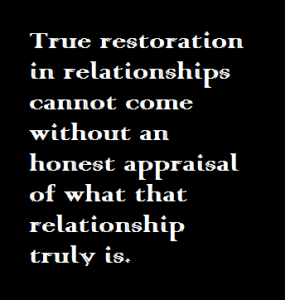Relational Sanity: Wisdom in Restoration
True restoration in relationships cannot come without an honest appraisal of what that relationship truly is.
Oftentimes, when there has been an matter of betrayal or disloyalty, there is a push by people on the outskirts of the issue towards “full reconciliation and restoration” but I believe that something important needs to take place first.
.
I believe that before there can be a restoration, before reconciliation (meaning “friendly relations”) is truly possible, one needs to take a good hard look at the relationship and see it for what it is because sometimes we really do not have much of a relationship at all and when we go back in to it, we have to go back in realizing that.
.
The restoration of a casual relationship is going to be entirely different than the restoration of a familial or marital relationship. If I am friends with someone who I give my all to, and they repeatedly show me that they have absolutely no regard for me, then I may need to restore the actual, shallow relationship, and not the one I wish existed. And there is nothing wrong with identifying the shallow relationships in our lives — in fact, doing so protects us from bitterness and anger. After all, we cannot force someone to feel more for us than they do, and we don’t really have a right to. We also cannot force them to be loyal, or kind, or to do what is right. We cannot keep them from betraying us, or slandering us, or sinning against us — only love can do that and we have no control over whether or not someone loves us.
.
So restore the relationship as it exists, not the fairy-tale one. If a generally wonderful person screws up, and is genuinely repentant, then that is a case for restoring them to where they were. But if we are simply ignoring the fact that we are in a non-existent relationship (meaning no exchange, no mutual give and take), then restoring that relationship to our fairy tale idea is not restoration, but instead elevation. And there is nothing I can think of in scripture telling us to pretend that there is more to a relationship than there is.
.
There are people in this world that are impossible to have genuine relationships with — gossips, slanderers, bullies, people who are quick to assume the worst, people who refuse to take responsibility for their own actions, adulterers, etc. And it is okay to recognize that without feeling guilty about it. It’s okay to say, “I forgive you and I see that we really don’t have a relationship here. I thought we did, but looking back I see no evidence of a real relationship and so I am not going to pretend. I wish you well, but we have no basis for intimacy.”
.
We do not owe a relationship to those who do not have a relationship with us. That’s how the Body of Messiah gets into trouble, with dead-end relationships that require not just forgiveness but compromise. And the compromise is always at the expense of the person who is on the giving end. It’s the cheap grace version of restoration — hyper-restoration, if you will. But hyper-restoration is dishonest, and we cannot afford to be dishonest in our relationships, we have to see them for what they are.
.
Now, are we to be long-suffering with those who are actively escaping sin and trying and fail and are genuine in their repentance? Of course, that is grace in action, that is true grace. But there can be no true fellowship between two people when one of them has absolutely no desire for relational accountability, no desire to see themselves as wrong, only a desire to justify themselves and take from whoever will give.
.
So, when there has been a breach, look at the relationship carefully. Forgive the person. Look at the other person carefully. Ask the Father to show you the reality of the relationship. Then carefully restore the person to THAT relationship, the real one. In this way, you can deal with them as they are and not as you wish they were, with no illusions and no unrealistic expectations.
.
Forgiveness means seeing who a person is and not holding it against them. Restoration means recognizing exactly who they are and having the appropriate level of relationship in light of that.
.
Look at it this way — you have a piece of solid oak furniture, and even if it gets dented and stripped of its finish in some places, it’s still oak and can be restored. But if it’s just particleboard, you have to recognize that it is particleboard and hope, but not expect, that the particleboard will want to be oak and start doing the work to swap out its own parts. The relationship you can have with a piece of oak furniture is not the same as the relationship you can have with particleboard, and that’s a fact. And it’s okay to recognize it. It’s not okay to keep depending on the particleboard to respond like oak and then be bitter when it fails.
